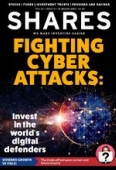Archived article
Please note that tax, investment, pension and ISA rules can change and the information and any views contained in this article may now be inaccurate.
New world order: the big impact of a geopolitical earthquake

Under Donald Trump, geopolitics was focused on US-China trade ties and pacifying North Korea and Russia.
President Biden is a different animal. He has the reputation of being less interventionist as the withdrawal of troops from Afghanistan demonstrated.
The subtle change to soft power and more diplomacy may have been a contributory factor in the timing of Putin’s move on Ukraine.
The invasion of Ukraine is the largest military campaign in Europe since the second world war. It has changed geopolitics dramatically and is now too important for investors to ignore.
WHAT SHOULD INVESTORS DO?
While the current geopolitics seem scary, chief investment officer for Europe, Middle East and Africa at Morningstar Dan Kemp reminds investors to stay calm and focus on the long-term.
Kemp told Shares that investor responses to unexpected events like war are predictable. In other words, there is a tendency to panic and become too focused on the short-term.
What is more important, said Kemp is to try to figure out the probable effects on a company’s long-term cash flows.
It is also important to think about different scenarios and the chances of them happening rather than making specific forecasts.
Finally, explained Kemp, share prices can move fast. This means they may have already discounted the worst case.
In other words, investors need to think about what they see as fair value for shares in relation to how they have already moved.
EVENTS MOVING AT SPEED
Events have certainly been moving at speed and resulted in developments which until recently seemed unimaginable. For instance, Germany said it would ramp up military spending by €100 billion, more than doubling planned 2022 spending on the military.
Chancellor Olaf Scholz said Germany could purchase US F-35 fighter jets made by US firm Lockheed Martin while also urging European partners to build their own ‘next generation’ fighter jets and tanks.
Reversing a decades long policy of not supplying weapons to ‘conflict zones’ Germany said it would send anti-tank weapons, surface-to-air missiles and ammunition to Ukraine.
Perhaps European leaders have realised they need to protect their borders irrespective of NATO (North Atlantic Treaty Organisation). NATO has 30 members and was set up in 1949 to guarantee freedom and security through political and military means.
While it is often thought NATO was set up in response to the threat from the Soviet Union, it has broader purposes. These include forbidding nationalist militarism in Europe and encouraging political integration.
The West has so far restricted its actions to implementing financial deterrents by imposing the most stringent sanctions ever seen to strangle the Russia’s finances and force it to the negotiating table.
At the same time, Britain, the US and other European countries are providing weapons and ammunition to Ukraine so it can protect itself more effectively.
US investor Bill Ackman, the founder and lead manager of Pershing Square Holdings (PSH) believes in providing more weapons to Ukraine.
On social media he has said this will make it more painful for Russia and shorten the time to a negotiated resolution.
In an earlier thread on Twitter he commented: ‘In January 2020, I had nightmares about the potential for a pandemic, but everyone seemed to think I was crazy. I am having similar nightmares now. WWIII has likely started already, but we have been slow to recognize it. Putin has invaded Ukraine and it is not going well.’
OTHER PARTIES TAKING ADVANTAGE
There are concerns the war in Ukraine could create domino effects in other politically sensitive parts of the world.
The US administration has raised concerns again recently over North Korea’s development of long-range nuclear weapons. In January North Korea launched an intermediate-range ballistic missile test for the first time in four years.
US intelligence believes its range could be up to 4,500 kilometres which means it could reach Japan.
More tests were conducted in February and March and officials are worried the North Koreans are tinkering with a new system which could allow weapons to travel greater distances, even as far as the US.
The timing of these activities could be linked to the build-up in tensions on the Ukraine border.
It raises the possibility of North Korea and other nations hostile to the West using the Ukraine invasion as an opportunity to challenge the US while it is preoccupied with Eastern Europe.
Biden has said he is willing to engage with Korean leader Kim Jong Un but there doesn’t seem to be a sense of urgency to engage in the same manner as his predecessor Trump.
A NEW WORLD ORDER
The biggest unknown quantity in the current conflict is the role China might play. China is the second biggest economy in the world, equivalent to the combined size of Japan, Germany, UK and France.
While president Xi Jinping is on friendly terms with Putin, China has a vested interest in maintaining a stable world economic system and its membership of the WTO (World Trade Organisation).
The reason is because China’s does most of its trade with the EU and the US. The yuan is China’s currency unit used in the international financial system. The official currency is called renmimbi.
The yuan is the eighth most traded currency in the world and held as reserve currency by major central banks. China has ambitions to make the yuan the world’s leading reserve currency, taking over from the mighty US dollar.
For decades all the world’s major commodities have been priced in US dollars.
News of Saudi Arabia discussing the possibility of selling some of its oil to Russia in yuan may be a significant turning point, should it come to fruition, according to Carlos von Hardenberg, co-founder of Mobius Investment Trust (MMIT).
Saudi-US relations have become less cordial after the civil war in Yemen and negotiations with Iran over its nuclear program.
This could mark a critical shift in the dollar’s dominance in international trade and tip the balance of power further towards Asia.
Hardenberg told Shares he believes China’s long-term goals are stability, economic growth and increasing the influence of the yuan in world trade.
Despite speculation China might use the distraction of the war in Ukraine to initiate a military-led integration of Taiwan, Hardenberg thinks this is highly unlikely.
Although China has never recognised the country as an independent territory, it has always taken a very long-term approach to achieving its goals, explained Hardenberg.
Important information:
These articles are provided by Shares magazine which is published by AJ Bell Media, a part of AJ Bell. Shares is not written by AJ Bell.
Shares is provided for your general information and use and is not a personal recommendation to invest. It is not intended to be relied upon by you in making or not making any investment decisions. The investments referred to in these articles will not be suitable for all investors. If in doubt please seek appropriate independent financial advice.
Investors acting on the information in these articles do so at their own risk and AJ Bell Media and its staff do not accept liability for losses suffered by investors as a result of their investment decisions.
Issue contents
Editor's View
Feature
- Why Magners maker C&C can cope with unprecedented cost inflation
- Fighting cyber attacks: Invest in the world's digital defenders
- Which is better - high yield today or dividend growth tomorrow?
- New world order: the big impact of a geopolitical earthquake
- Private equity has made a lot of people rich – how do you get invest in it?
Great Ideas
- BlackRock Throgmorton is a great fund for a small cap recovery rally
- Cordiant Global Infrastructure remains a way to play the growth in digital assets
- Why Berkshire Hathaway is hitting fresh highs
- FDM shows substantial recovery potential at shares rally 21% in two weeks
- US growth can drive undervalued Homeserve shares higher
- Essentra to become a streamlined components champion
News
- Chancellor Sunak’s spring statement full of surprise support measures
- Ferguson to leave the FTSE 100 in May as it focuses on the US
- Robust results from Nike as direct to consumer strategy delivers
- IG and Plus500 venture overseas with mixed success
- Hospitality enjoys good times despite spending pressures
- Value and inflation protection leave FTSE 100 well placed
- Hong Kong suspends shares in Chinese property giant Evergrande

 magazine
magazine








